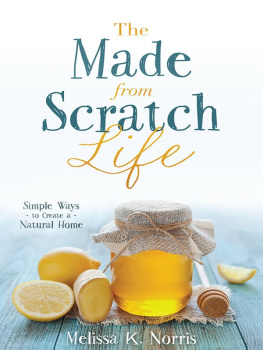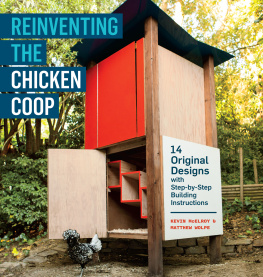MADE FROM SCRATCH
Discovering the Pleasures of a Handmade Life
MADE FROM SCRATCH
Discovering the Pleasures of a Handmade Life

JENNA WOGINRICH

THANKS SO MUCH
Thanks so much to my parents, Pat and Jack, and my siblings, Kate and Johnny, who put up with me and my constant moving around the country all these years. Thank you, Diana and Bruce Carlin and everyone who was a part of Floating Leaf Farm, for your mentoring and, more importantly, friendship. Thank you to the Crawford family, who went above and beyond the call of duty as neighbors in Sandpoint. Thanks to the Tobias. Thank you, Carleen Perkins, the best editor in America, if only for the fact that she has a paint-by-number of Monticello over her desk. Also at Storey, thanks to Dan Williams, art director; Amy Greeman, publicity director; and Deborah Balmuth, editorial director. Thanks to Karen Kresge, my design professor, who pushed me so much to get my act together in college. Thanks to Kevin Boyle, Erin Griffiths, Nick Cooley, Heather Kerchner, Marie Hofer, Marjan Schelling, Erin Wert, Rikki Hamilton, Sean Sullivan, and Sara and Tim Mack, for taking the time to read through things with me and help out along the way with your advice and patience. Thanks to Raven Pray Bishop, who told me over the phone one night I should write this book and pushed me to get started. Thank you, Brian Campbell, for being the inspiration to all of us city-dwelling mountain folk, and thanks to Wayne Erbsen for writing those amazing books that taught me everything I know on the fiddle and banjo. Thank you, Kutztown University, for bringing design and amazing people into my life and leading me to Knoxvilles door. And thanks to the Keystone, Gem, Green Mountain, and Volunteer
states for everything you taught me. I owe you.
And, of course, a special thanks to Jazz and Annie,
the best roommates a girl could ever have.
FOR ANNA JUMBAR (THIS IS ALL YOUR FAULT)
The mission of Storey Publishing is to serve our customers by
publishing practical information that encourages
personal independence in harmony with the environment.
Edited by Carleen Madigan Perkins
Art direction and book design by Dan O. Williams
Text production by Dan O. Williams and Jennifer Jepson Smith
Cover illustration by Lucie Summers
2008 by Jenna Woginrich
All rights reserved. No part of this book may be reproduced without written permission from the publisher, except by a reviewer who may quote brief passages or reproduce illustrations in a review with appropriate credits; nor may any part of this book be reproduced, stored in a retrieval system, or transmitted in any form or by any means electronic, mechanical, photocopying, recording, or other without written permission from the publisher.
The information in this book is true and complete to the best of our knowledge. All recommendations are made without guarantee on the part of the author or Storey Publishing. The author and publisher disclaim any liability in connection with the use of this information. For additional information, please contact Storey Publishing, 210 MASS MoCA Way, North Adams, MA 01247.
Storey books are available for special premium and promotional uses and for customized editions. For further information, please call 1-800-793-9396.
Printed in the United States by R.R. Donnelley
10 9 8 7 6 5 4 3 2
Library of Congress Cataloging-in-Publication Data
Woginrich, Jenna.
Made from scratch / Jenna Woginrich.
p. cm.
ISBN 978-1-60342-086-0 (hardcover w/ jacket : alk. paper)
1. Self-reliant living. 2. Country life. 3. Urban home-steading. I. Title.
GF78.W64 2009
640dc22
2008034045
PREFACE
THE GENERAL OPINION IS, if you want a more self-reliant lifestyle, then youd better run off to the country and buy a log cabin on five pretty acres. It should come complete with amazing views, a fixed-rate mortgage, and a porch swing all of it miles away from the nearest shopping center or strip mall. Of course, we all know postcard property and an address arent enough. You should also get a barn full of livestock, rolling fields of vegetables, and an old pickup truck with lots of rustic character. It also wouldnt hurt to have a shed stocked with every tool imaginable and a cellar stocked with rows of canned goods. Make sure theres a nice elderly couple next door to dispense advice. You know, someone to help you out when you need a cup of sugar, that kind of thing. (By the way, all of this should reside in some picturesque mountain valley where the word reckon is a regular part of the local vocabulary.) Heck, you could add all sorts of other requirements on top of that already tall order: renewable energy sources, a big green tractor, and maybe even a rumpled border collie sleeping on a feed sack in the sun.
Sounds heavenly doesnt it?
Sure does to me, but heres the catch. That general opinion leaves out a lot of eager people. Just because you wont be moving out of your apartment anytime soon doesnt mean you cant be more self-sufficient. Plenty of people in suburbs and sublets all over the country are replacing their pansies with peas and putting up henhouses where the doghouses used to be. Knitters are casting on in subways, and homebrewed wine is fermenting in your neighbors basement. A revolution in self-sufficiency is riding the L train, and we saved you a seat.
I do many of the same things homesteaders do, but I dont own any land or even know how to start up a tractor. (Dont tell that to the guys down at the co-op itll destroy my street cred.) I also dont have a barn full of livestock or drive a truck (I drive a dented station wagon, but hey, it hauls its share of chicken feed). In addition to those shortcomings, I dont even work at home. Im a nine-to-five corporate employee, and thats a position that doesnt lend itself to anyones mental picture of American Gothic. (I guess if you replaced the farmers pitchfork with a wireless mouse and gave him a pair of horn-rimmed glasses, youd have a start.) Even so, if youre reading this, theres a good chance you work a day job, too. We all know the real world has real bills, and we cant quit our offices just yet.
What you can do, though, is change the way you live, no matter where you live. You can make better decisions every day; you can learn the skills that make for a more independent way of living. When you do, youll start to feel more appreciation for those everyday tasks, because at the end of that day youre more in control of your life. Thats really what this boils down to.
The work in this book isnt about playing farmer, its about being more responsible for the tasks weve become numb to. We expect food to be waiting at markets and entertainment to be a few buttons away. When you start producing your own food, even the simplest plot of potatoes, your life regains some of the authenticity weve all forgotten about. When you sit back against a tree with a mandolin on your lap instead of lying on the couch with three hundred channels of instantly recordable distraction, you gain a little more from your downtime. Youll find yourself more humbled, satisfied, and grateful to have found a balance that simplifies your life with the skills of the people who came before you.
Point is, it feels good to get dirty, work hard, and slow down.
INTRODUCTION

Next page





